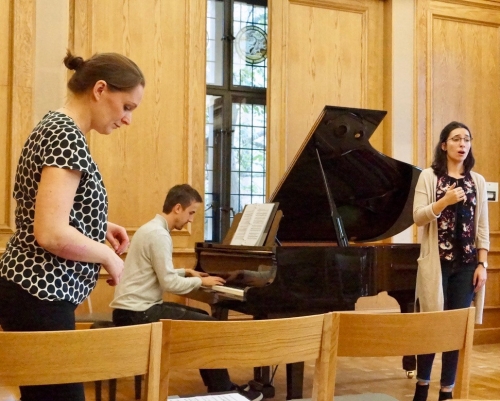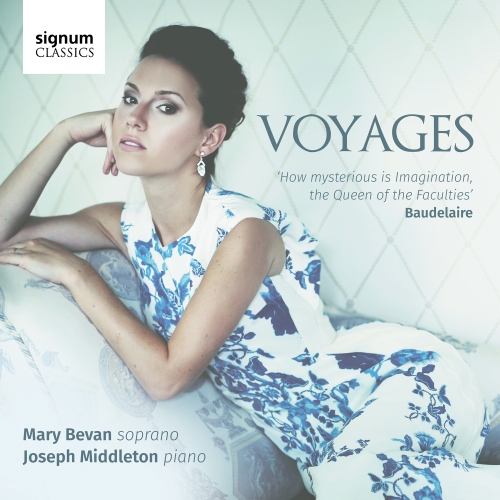After more than a decade researching French poetry and how it intersects with music through song, people often ask me what I do with this knowledge. The short answer is: language coaching. But while the idea of a ‘language coach’ is familiar to most in the classical music industry who train in the conservatoire tradition, it is little understood outside of the sector. To explain what I do, and how much both I and singer/pianist duos I work with can benefit from a collaborative coaching session, the 2018 Oxford Lieder Mastercourse day on French song (specialising in Verlaine/Debussy) is a good place to start.
Nine early-career international song duos came to work with me on the poetry of Paul Verlaine (1844-1896) and songs composed by Claude Debussy (1862-1918), whose centenary year Oxford Lieder were marking in the 2018 festival season.

Debussy had worked with Verlaine’s poetry throughout his career, from the early songs composed in the 1880s to his later songs composed in the first decade of the 1900s. Debussy’s particular preference for Verlaine is shown in the fact that he set 17 Verlaine poems to music over the course of his career – by far the highest number of poems from any of the poets whose work he chose to set. Overall, Debussy wrote just under 100 songs, using French poets from the modern era (Banville, Baudelaire, Bourget, Gautier, Leconte de l’Isle, Louÿs, Mallarmé, Musset, Verlaine) as well as those from earlier centuries (Tristan l’Hermite, Charles d’Orléans, Villon), and even trying his hand at writing his own words (such as for the Prose lyriques composed in the early 1890s). Debussy’s affinity for the subtleties of French verse is well-known; but he is never ‘perfect’ in the way he sets poetry to music – even if such a thing were ever possible. With the Verlaine settings, we can see this in practice: Debussy reworked a number of his songs, such as Clair de lune, which he originally composed for his muse, the coloratura soprano Madame Vasnier (1882), but which he later reworked for publication in the first book of the Fêtes galantes (1891). The two settings of the same poem differ in a number of ways – Debussy reduces the amount of line repetition he includes in the newer version, and he recasts the metrical emphases in the setting of the opening line, for example. But when we look at the poem itself – made up of 3 quatrains of decasyllables, using an alternating rhyme – we find that it is a text that ‘falls forward’ because the sense-units exceed the confines of the verse line. Specifically:
(a) sentence construction is not in normal order of everyday language
(b) the images and ideas exceed the confines of the line
(c) sound + word repetition with variation plays with tempo
When Debussy encounters a poem that functions in this way (and many of Verlaine’s do), he has to find a way to negotiate the demands of the poetic text. The fact remains that working with poetry always leaves open various possible options for reading it – which lines you join together, or which words you might pause on, for example. Debussy’s reworking of his own setting of Clair de lune does not ‘fix problems’ with the early version, but simply reworks them, offering a different response to the poetic text, and one which is perhaps more mature, in the sense of someone having spent a longer time with the poem.
Thinking about composers’ responses to poetry as being a record of what they were thinking at the time, as opposed to a definitive version, is particularly helpful for singers and pianists encountering songs such as Debussy’s settings of Verlaine. It means that we do not have to be completely reverential to the way the song has been written down, but we need to accept that the score has captured a way of performing the poem – for which there is still a great deal of flex.
In my work with the duos at the 2018 Oxford Lieder Mastercourse, we explored:
- following the piano line, especially the piano right-hand ‘melody’ as the driver of a phrase rather than allowing the singer/vocal line to drive the direction
- whether the vocalises on ‘La’ or ‘Ah’ in Debussy’s songs should really be followed to the letter, or whether there is more freedom, e.g. to flex the rhythm/tempo, switch rapidly between different types of vocal colour for each motif, experiment with more improvisatory techniques such as switching up or down the octave at given moments
- how the emotion of the poetic text is captured in the prevalence of vowels or consonants, such as repeated rhyme sounds on the same vowels as a kind of ‘stuck record’ of a poetic mind ‘trapped’
- whether we need to know the poet’s or the composer’s biographies to tell stories with these songs – do failed marriages, scandals of the heart, mistresses, lovers, affairs open up different routes into interpreting the songs?
- how much the aesthetic of each artist informs the works, such as the dominance of decadence (challenging the current moral framework) and symbolism (challenging how language tells you things, and how to exploit the way language can subtly suggest things more indirectly) in Verlaine’s writing.
- whether the cultural heritage that was so popular in the late nineteenth-century, especially the look to the past to exploit ideas of old-fashioned courtship, and the use of ‘stock characters’ from the Italian commedia dell’arte tradition, can inform how we perform the songs today – should we take on the role of a teenage boy bumbling across the stage and trying to pirouette four times (as in Pantomime)?
This kind of work is more than just trying to be sure about how to pronounce the words – whether an ‘s’ should be soft or more like a z, whether to run two sounds together or make them distinct, whether we should spit out the consonants or leave them to the last minute and hardly mark them. Instead, it is all about informed interpretation, which relies on an extensive body of expertise (knowing a lot about nineteenth-century French poetry, poetics, aesthetics, and versification), and an ability to collaborate with singers’ and pianists’ own creativity as they bring their own perspectives to bear on the performances.

Of course, as is common in Masterclasses and coaching sessions, we pushed most things too far. It’s by going to extremes that you enable yourself to locate where the ‘sweet spot’ of performance really is. You begin to feel right inside the song how it is working and can work for you and your audiences. It releases a mode of story-telling which is not about overt dramatisation or quiet introspection, but about intensity of feeling.

 I enjoyed reading
I enjoyed reading 